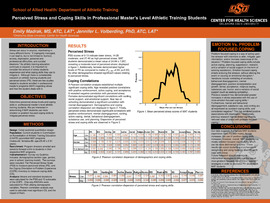| dc.contributor.author | Madrak, Emily | |
| dc.contributor.author | Volberding, Jennifer L. | |
| dc.date.accessioned | 2020-05-05T19:37:50Z | |
| dc.date.available | 2020-05-05T19:37:50Z | |
| dc.date.issued | 2020-02-28 | |
| dc.identifier | ouhd_madrak_perceivedstressandcoping_2020 | |
| dc.identifier.citation | Madrak, E., & Volberding, J. L. (2020, Feb. 28). Perceived stress and coping skills in professional master's level athletic training students. Poster presented at Research Day at Oklahoma State University Center for Health Sciences, Tulsa, OK. | |
| dc.identifier.uri | https://hdl.handle.net/11244/324222 | |
| dc.description.abstract | Background: As athletic training education continues to expand, it is important to consider the amount of stress students experience and what coping skills they use to mitigate it. Although there is considerable research on athletic training students and perceived stress (PS), there are few studies related to students enrolled in professional master's programs (MAT) regarding stress. | |
| dc.description.abstract | Methods: Cross-sectional design with current students in Commission on Accreditation of Athletic Training Education (CAATE) accredited MAT programs (males=42, females=99, age=23.42 ± 2.91 years). Program directors were asked to forward a link to students in their respective MAT programs. The survey included a brief demographics section (age, gender, year in school, learning model). Two surveys were included: The Perceived Stress Scale (PSS) (reliability a=0.78) to measure perceived stress (PS), and the Coping Orientation to Problem Experience (COPE) inventory (reliability a=0.73) to measure coping skills (CS). Means and standard deviations were calculated for the PSS and 15 subscales of the COPE. One-way ANOVA's were calculated for PSS utilizing demographic variables. Pearson correlation analysis was used to calculate most significant CS, and the impact of them. | |
| dc.description.abstract | Results: A mean PSS score (24.84 ± 7.267) revealed a moderate level of PS in MAT students. ANOVA demonstrated increased PS in females, in comparison to males (F(1,139) =4.93, p=.03). Pearson correlation analysis established multiple significant coping skills. Age revealed positive correlations with positive reinforcement (r=0.168, p=0.05), active coping (r=0.25, p <0.01), and acceptance (r=0.25, p <0.01); and negative for PS (r= - 0.18, p=0.03). Gender revealed significant correlations for females in venting (r= -0.19, p=0.02), social support (r= -0.22, p <0.01), and emotional support (r= -0.20, p=0.02). Year 2 of schooling demonstrated a significant correlation with mental disengagement (r=0.25, p <0.01). Learning model presented significant correlations with venting (r=0.18, p <0.01) and mental disengagement (r= -0.171, p <0.05). Perceived stress demonstrated significant correlations with positive reinforcement (r= -0.25, p <0.01) mental disengagement (r=0.188, p <0.05), venting (r=0.36, p=0.00), active coping (r= -0.27, p=0.001), denial (r=0.25, p <0.01), behavioral disengagement (r=0.39, p=0.00), substance use (r=0.25, p <0.01), and planning (r= -0.30, p=0.00). | |
| dc.description.abstract | Conclusions: Our data suggests that female MAT students experience more PS than males. As age increases, the use of constructive coping skills increases. However, overall, MAT students use CS that are more detrimental to stress. These results can assist students and professors in recognizing and using healthier alternatives to cope with stress. | |
| dc.format | application/pdf | |
| dc.language | en_US | |
| dc.publisher | Oklahoma State University Center for Health Services | |
| dc.rights | The author(s) retain the copyright of have the right to deposit the item giving the Oklahoma State University Library a limited, non-exclusive right to share this material in its institutional repository. Contact Digital Resources and Discovery Services at lib-dis@okstate.edu or 405-744-9161 for the permission policy on the use, reproduction or distribution of this material. | |
| dc.title | Perceived stress and coping skills in professional master's level athletic training students | |
| osu.filename | ouhd_madrak_perceivedstressandcoping_2020.pdf | |
| dc.type.genre | Presentation | |
| dc.type.material | Text | |
| dc.subject.keywords | athletic training students | |
| dc.subject.keywords | coping mechanisms | |
| dc.subject.keywords | perceived stress | |
| dc.subject.keywords | professional master's level athletic training education | |
